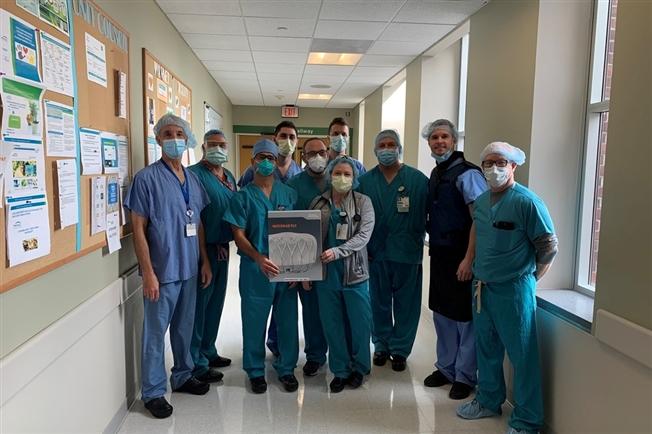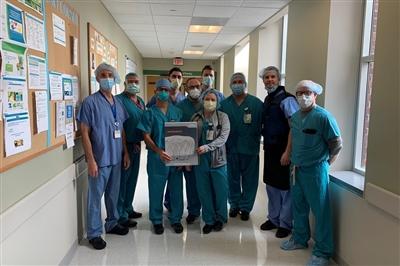Main Line Health first in Philadelphia region to offer WATCHMAN FLX implant for atrial fibrillation


Electrophysiologist Sheetal Chandhok, MD, assisted by William Gray, MD, performed the first WATCHMAN FLX implant at Bryn Mawr Hospital, part of Main Line Health’s Lankenau Heart Institute.
“Lankenau Heart Institute is committed to providing safe, compassionate, clinically advanced cardiac care to our patients. The opportunity to pilot innovative solutions like the WATCHMAN FLX is critical to helping us achieve this, and we are honored to have been the first in the Philadelphia region to implant this device,” said Dr. Gray, System Chief of Cardiovascular Disease at Main Line Health, who has been involved with research in this approach for almost 20 years.
Up to six million Americans are affected by atrial fibrillation (AF) – an irregular heartbeat that feels like a quivering heart. People with AF may be at greater risk for stroke than those with normal heart rhythms. Traditionally, blood thinners have been used as a method of treatment to reduce stroke risk in patients with AF. However, long-term blood thinner use can lead to increased bleeding risk, even as a result of small wounds.
The WATCHMAN FLX implant is an alternative to blood thinners. The implant works by closing off an area of the heart called the left atrial appendage (LAA) to keep harmful blood clots that can form in the LAA from entering the blood stream and potentially causing a stroke. By closing off the LAA, the risk of stroke may be reduced and, over time, patients may be able to stop taking blood thinners.
Dr. Chandhok at Bryn Mawr Hospital was the first in Pennsylvania to implant the WATCHMAN LAAC in 2015, an earlier version of the implant. WATCHMAN FLX, the newest version of the implant, has an updated design to help treat more patients safely and effectively to ensure the best long-term outcomes.
“Many patients with atrial fibrillation have concerns about the long-term risks of blood thinners, but also don’t want to forego this medication because they know it is a critical part of managing their stroke risk,” says Dr. Chandhok. “The WATCHMAN FLX implant is an alternative that offers our patients peace of mind and a better quality of life.”
Implanting the WATCHMAN Device is a one-time procedure that usually lasts about an hour. Following the procedure, patients typically need to stay in the hospital for 24 hours. The WATCHMAN Implant has been approved in Europe since 2005 and is FDA-approved in the United States. It has been implanted in more than 110,000 patients and is approved in more than 70 countries around the world.
About Main Line Health
Founded in 1985, Main Line Health is a not-for-profit health system serving Philadelphia and its suburbs. Main Line Health's commitment — to deliver safe, high-quality, equitable and affordable care for treating and curing disease, playing an important role in prevention and disease management, as well as training physicians and other health care providers — reflects our intent to be the region's premier choice for clinical care, research, and education. A team of more than 13,000 employees and over 2,100 employed and independent physicians and advanced practice providers care for patients throughout Main Line Health.
At Main Line Health's core are four of the region's most respected acute care hospitals — Lankenau Medical Center, Bryn Mawr Hospital, Paoli Hospital and Riddle Hospital — as well as one of the nation's premier facilities for rehabilitative medicine, Bryn Mawr Rehab Hospital.
Main Line Health also includes Mirmont Treatment Center for drug and alcohol recovery; Main Line Health HomeCare & Hospice, which includes skilled home health care, hospice and home infusion services; Main Line Health Centers, primary and specialty care, lab and radiology, and other outpatient services located in Broomall, Collegeville, Concordville, Exton, King of Prussia and Newtown Square; Lankenau Institute for Medical Research, a biomedical research organization; and Main Line HealthCare, one of the region's largest multispecialty physician networks.
Main Line Health is the recipient of numerous awards for quality care and service, including the prestigious American Hospital Association Quest for Quality Prize, highest tier ratings from the Centers for Medicare & Medicaid Services (CMS) for Overall Hospital Quality and systemwide recognition in the 2023-2024 U.S. News & World Report Best Hospitals rankings. Main Line Health is committed to creating an environment of diversity, respect, equity and inclusion, has proudly received awards in this area and has embraced the American Hospital Association's #123forEquity Pledge to Act to eliminate disparities in care. We are dedicated to advancing patient-centered care, education and research to help patients stay healthy and live their best lives.
For more information, visit mainlinehealth.org and connect with us on social media:
LinkedIn: www.linkedin.com/company/main-line-health
Facebook: www.facebook.com/mainlinehealth
X (formerly known as Twitter): www.twitter.com/mainlinehealth
Instagram: www.instagram.com/mainlinehealth
About Lankenau Heart Institute
The Lankenau Heart Institute is Main Line Health's premier comprehensive cardiovascular medicine and surgery program. Lankenau Heart Institute brings together the clinical expertise of all four Main Line Health acute care hospitals and both the employed and community cardiology practices to ensure that patients receive a level of quality, service and experience that is unparalleled in the region. Through the systemwide coordination of services, Lankenau Heart Institute delivers preventive, diagnostic, therapeutic and rehabilitative cardiovascular services at each of our locations including Lankenau Medical Center, Bryn Mawr Hospital, Paoli Hospital and Riddle Hospital.
Lankenau Heart Institute continues to be an innovator in the use of beating-heart techniques and robotic-assisted procedures for coronary artery revascularization, minimally invasive and transcatheter approaches for valve repair and replacement, complex aortic surgery and heart rhythm disorders. With our growing experience and focus on minimally invasive techniques, Lankenau Heart Institute has expanded participation in clinical trials year after year. Our physicians are frequently invited to participate in clinical/medical device trials, many of which are designed to facilitate the use of minimally invasive approaches and procedures.
With a collaborative team of expert consultative cardiologists, interventional cardiologists, electrophysiologists, cardiovascular surgeons and specially trained advance practice nurses and technologists, Lankenau Heart Institute is dedicated to managing and treating patients with simple to complex cardiovascular disease, including heart failure, aortic disease, coronary and peripheral vascular disease, lipid and genetic abnormalities, heart rhythm disorders and valve disease. Our team of cardiologists and cardiac and vascular specialists provide patients and their families with expert cardiovascular care, close to home.
Contact
Phil Ellingsworth, Jr.Director, Communications
Office: 484.580.1182
EllingsworthPh@mlhs.org